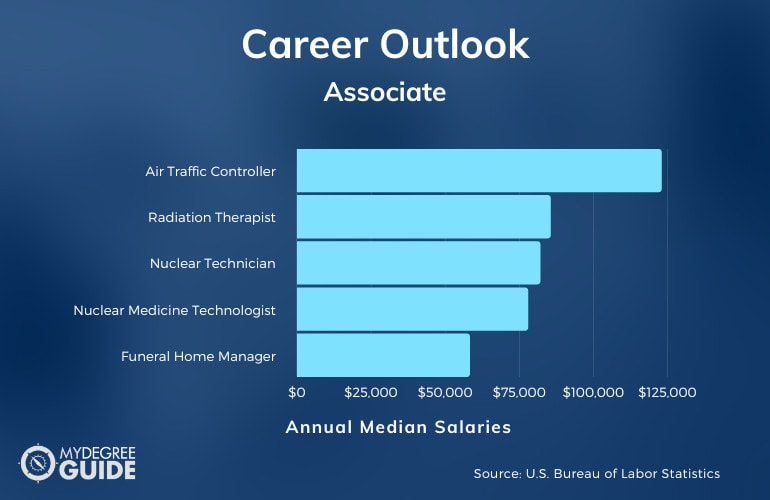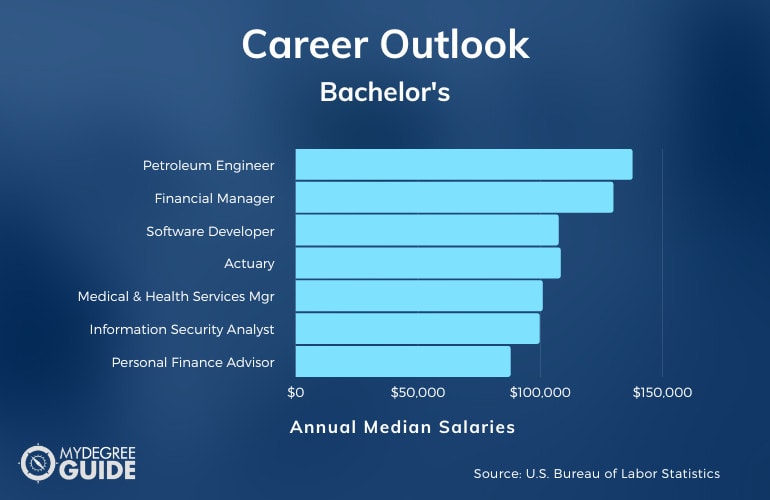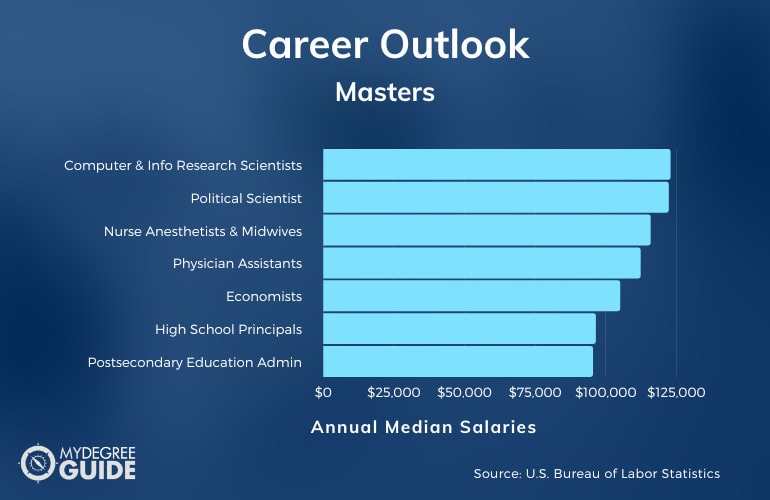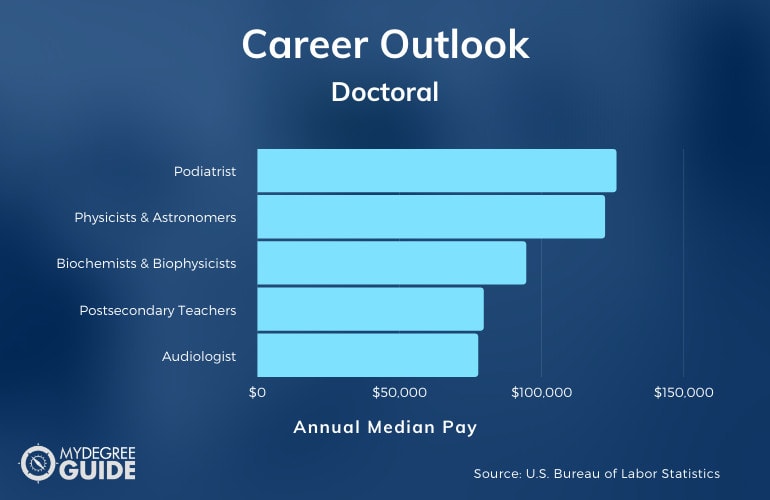Choosing the College Degree That’s Right for You
A bigger paycheck. Less risk of unemployment during lean economic times. More prestige at work and potentially within your own social circle as well. Or the opportunity to increase your lifetime earnings to the tune of hundreds of thousands of dollars (or more!) with the right degree.
If any of these reasons sound motivating to you, you may be considering investing in a college degree.

But which college degree is right for you? What are the best majors for future jobs?
For some people, it’s the quickest degree they can find (at the best price).
On the one hand, an Associate degree can be obtained in only two years, but on the other hand, a Master’s degree or even a Doctorate degree may give you a distinct edge in the eyes of a potential employer.
Editorial Listing ShortCode:
Let’s consider the factors involved in the major degree levels (Associate, Bachelors, Master’s or Doctorate) and the opportunities that each degree level can unlock to enable you to pursue the college degree that will work for you.

Associate Degrees
Editorial Listing ShortCode:
What Kind of Associate Degrees are Available?
An Associate degree can be the first stepping stone in your post-secondary education, but that doesn’t mean that there is only one stone in this path!
- Associate of Arts
- Associate of Engineering or Associate in Electronics Engineering Technology
- Associate of Science
- Associate of Forestry
- Associate of Technology
- Associate of Applied Business
- Associate of Applied Science or Associate of Arts and Sciences
- Associate of Arts in Teaching
- Associate of Baccalaureate Studies
- Associate of Business Administration
- Associate of Engineering Science
- Associate Degree in Nursing
- Associate in Engineering Technology
- Associate of Fine Arts
- Associate of Pre-Engineering
- Associate of Industrial Technology
- Associate of Occupational Studies
- Associate of Political Science or Associate of Public Service
- Associate of Applied Arts
- Associate of General Studies
- Associate of Science in Nursing
- Associate in Physical Therapy
Why Should I Get an Associate’s Degree?
- Flexibility – If you choose to pursue an Associate degree, you may be able to complete your entire degree without leaving town! In fact, CollegeBoard shares that there’s a campus within a short driving distance of almost every town in the United States! That means you may be able to build your career, without having to worry about relocating and finding a new job or house!
- Reduced Costs – If you are considering a college degree to increase your weekly take home, then getting an Associate degree is considerably cheaper than other college degrees. In fact, the average cost of tuition and fees at a public community college can be as little as $3,660 a year! (Source: CNBC)
- Less time Commitment – An Associate degree can be completed in 2 short years. That means spending less time in class, and more time climbing your career ladder!
- Future Educational Opportunities – After a few great classes, you may discover that you love learning and want to further your education. An Associate degree can be a great way to explore your passions, and then transfer your college credit to a post-secondary college to complete a Bachelor’s degree.
- Higher Earnings – Earning an Associate degree may increase your weekly paycheck by an extra $141 above the $746 weekly earnings of a typical employee with a high school diploma. (Source: Bureau of Labor Statistics)
- Reduced Risk of Unemployment – In the current marketplace, job security is vital! According to the Bureau of Labor Statistics, associate degree holders have a lower rate of unemployment than those who hold just a high school diploma.
How Many Credits is an Associate’s Degree?
An Associate’s degree is a short-term commitment, usually requiring only 60 credit hours for completion. If we could get college credit for Netflix binging, we’d all have our Associates by now!
How long does it take to complete an Associate’s Degree?
Whether you choose to get a “Transfer Degree” designed to assist you in further education and an eventual Bachelor’s degree or decide to invest in a straightforward Associate’s degree, it usually takes about 2 years to complete an Associate’s degree.
You may also finish your accelerated degree online fast by enrolling in classes that last only 6 weeks or less.
Associate Degree Careers

Getting an Associate’s degree can help open up the door for you and allow you to step up financially. According to the Bureau of Labor Statistics, professionals employed in the following careers make on average between $60,000 and $80,000 annually.
| Careers | Annual Median Pay |
| Air Traffic Controller | $122,990 |
| Radiation Therapist | $85,560 |
| Nuclear Technician | $82,080 |
| Nuclear Medicine Technologist | $77,950 |
| Funeral Home Manager | $58,310 |

Bachelor’s Degree
Editorial Listing ShortCode:
What Kind of Bachelor’s Degrees are Available?
If you are looking for a way to advance your career, improve your financial standing with the highest paying bachelors, and grow intellectually, take a look at this list to see the types of Bachelor degrees are available for you.
If you want to earn your degree faster, you can also look into accelerated online bachelor’s degree programs.
- Bachelor of Architecture (BArch)
- Bachelor of Applied Arts (BAA)
- Bachelor of Arts (BA, AB, BS, BSc, SB, ScB)
- Bachelor of Applied Arts and Science (BAAS)
- Bachelor of Applied Science in Information Technology (BAppSc(IT))
- Bachelor of Design (BDes, or SDes in Indonesia)
- Bachelor of Engineering Technology (BSET)
- Bachelor of Engineering (BEng, BE, BSE, BESc, BSEng, BASc, BTech, BSc(Eng), AMIE, GradIETE)
- Bachelor of Business Administration (BBA)
- Bachelor of Science in Business (BSBA)
- Bachelor of Management and Organizational Studies (BMOS)
- Bachelor of Business (BBus or BBus)
- Bachelor of Technology (B.Tech. or B.Tech.)
- Bachelor of Science in Public Health (BSPH)
- International Business Economics (BIBE)
- Bachelor of Kinesiology (BKin, BSc(Kin), BHK)
- Bachelor of Library and Information Science (B.L.I.S.)
- Bachelor of Management Studies (BMS)
- Bachelor of Administrative Studies
- Bachelor of Business Information Systems (BBIS)
- Bachelor of International Business Economics (BIBE)
- Bachelor of Commerce (BCom, or BComm)
- Bachelor of Library Science (B.L.S., B.Lib.)
- Bachelor of Fine Arts (BFA)
- Bachelor of Urban and Regional Planning (BURP and BPlan)
- Bachelor of Arts in Organizational Management (BAOM)
- Bachelor of Science in Nursing (BN, BNSc, BScN, BSN, BNurs, BSN, BHSc.)
- Bachelor of Business Science (BBusSc)
- Bachelor of Accountancy (B.Acy. or B.Acc. or B. Accty)
- Bachelor of Science in Information Technology (BSc IT)
- Bachelor of Comptrolling (B.Acc.Sci. or B.Compt.)
- Bachelor of Economics (BEc, BEconSc; sometimes BA(Econ) or BSc(Econ))
- Bachelor of Landscape Architecture (BLArch)
- Bachelor of Science in Human Biology (BSc)
- Bachelor of Computer Science (BCompSc)
- Bachelor of Computing (BComp)
- Bachelor of Science in Education (BSE, BS in Ed)
- Bachelor of Philosophy (BPhil, PhB)
- Bachelor of Computer Applications (BCA)
- Bachelor of Science in Psychology (BSc(Psych)
- Bachelor of Mathematics (BMath)
- Intercalated Bachelor of Science (BSc)
- Bachelor of Medical Science (BMedSci)
- Bachelor of Integrated studies (BIS)
- Bachelor of Medical Biology (BMedBiol)
- Bachelor of Arts for Teaching (BAT)
- Bachelor of Art in Music (BA in Music)
- Bachelor of Health Science (BHS & BHSc)
- Bachelor of Aviation (BAvn)
- Bachelor of Divinity (BD or BDiv)
- Bachelor of Theology (B.Th.; Th.B. or BTheol)
- Bachelor of Religious Education (BRE)
- Bachelor of Religious Studies (BRS)
- Bachelor of Film and Television (BF&TV)
- Bachelor of Journalism (BJ, BAJ, BSJ or BJourn)
- Bachelor of Liberal Arts (B.L.A.; occasionally A.L.B.)
- Bachelor of General Studies (BGS, BSGS)
- Bachelor of Applied Studies (BAS)
- Bachelor of Liberal Studies
- Bachelor of Professional Studies (BPS)
- Bachelor of Tourism Studies (BTS)
- Bachelor of Public Affairs and Policy Management (BPAPM)
- Bachelor of Music (BM or BMus)
- Bachelor of Music Education (BME)
- Bachelor of Science in Law (BSL)
- Bachelor of Arts in Psychology (BAPSY)
- Bachelor of Mortuary Science (BMS)
- Bachelor of Science and/with education degree (BScEd)
- Bachelor of Science in Forestry (B.S.F. or B.Sc.F.)
- Bachelor of Social Science (BSocSc)
- Bachelor of Arts in Social Work (BSW or BASW)
- Bachelor of Talmudic Law (BTL)
- Bachelor of Technology (B.Tech)
- Bachelor of Applied Science (BASc)
- Bachelor of Mathematical Sciences (BMathSc)
The two most common types of bachelor’s degrees are the Bachelor of Arts and the Bachelor of Science. We take a closer look at these two degree type here: BS vs. BA – What’s the Difference?
It’s also interesting to note that in some fields, there are additional degree types. For example, there are several different types of business degrees including a Bachelor of Business Administration, a Bachelor of Science in Business Administration, and a Bachelor of Arts in Business Administration.
Why Should I Earn a Bachelor’s Degree?
According to the New York Times article “It Takes a B.A. to Find a Job as a File Clerk” many employers require their employees to have a minimum of a Bachelor’s degree, no matter what position they hold in the company!
If you have ambitions of climbing the corporate ladder, start with building an educational foundation first by getting a Bachelor’s degree. Merely holding a Bachelor’s degree can help open up business opportunities that are locked for those who only have a high school diploma.
- Increased Earnings – According to the Bureau of Labor Statistics, bachelor’s degree holders make on average $502 more a week than those who hold just a high school diploma.
- Reduced Unemployment – With the job market feeling quite unstable these days, having a Bachelor’s degree may give you an edge. According to the Bureau of Labor Statistics, holding a Bachelor’s degree reduces the average unemployment rate from 3.7% (high school graduate) to 2.2%!
- Increased Lifetime Earnings – Looking at an expected 40-year career, having a Bachelor’s degree increases your potential lifetime earnings from a median of $1.7 million to $2.3 million. (Source: Georgetown University, The College Payoff: Education, Occupations, Lifetime Earnings)
How many credits is a Bachelor Degree?
A Bachelor’s degree usually requires 120 credits or approximately 40 college courses.
How long does it take to complete a Bachelor Degree?
If you put your back into it and complete your Bachelor’s degree as a full-time student, you may be able to hold your degree in about four or five years.
Want to finish sooner? Our article discussing how to get a bachelor’s degree fast may interest you.
Bachelor’s Degree Careers

A Bachelor’s degree may be an excellent step in the right direction to achieve financial security and career development. Having a Bachelor’s degree may make your resume more attractive to potential employers. Consider these careers that require a Bachelor’s degree for entry-level and offer average annual salaries of $80,000 or more, according to the Bureau of Labor Statistics.
| Careers | Annual Median Pay |
| Petroleum Engineer | $137,720 |
| Financial Manager | $129,890 |
| Software Developer | $107,510 |
| Actuary | $108,350 |
| Medical and Health Services Manager | $100,980 |
| Information Security Analyst | $99,730 |
| Personal Finance Advisor | $87,850 |
| Operations Research Analyst | $84,810 |

Master’s Degree
Editorial Listing ShortCode:
What Kind of Master’s Degrees are Available?
A Master’s degree requires a level of specialization that is not found at the bachelor’s degree level. For example, consider an online Master of Business Administration program. This program typically focuses entirely on business-related courses such as marketing, management, and human resources as you can see in our article discussing the most popular MBA concentrations. At the bachelor’s level, you’re usually required to undertake a well-rounded course of study that includes history, social science, humanities, and similar courses.
Consider using this list as a jumping off point as you consider what Master’s degree is the right choice for you.
- Master of Accountancy (MAcc, MAc, or MAcy)
- Master of Education (MEd, MEd, EdM, MAEd, MSEd, MSE, or MEdL)
- Master of Economics (MEcon)
- Master of Advanced Study (MAS)
- Master of Architecture (MArch)
- Master of Arts in Teaching (MAT)
- Master of Business Administration (MBA or MBA)
- Master of Applied Science (MASc, MAppSc, MApplSc, MASc and MAS)
- Master of Computational Finance (or Quantitative Finance)
- Master of Computer Science (MCS)
- Master of Arts (MA, MA, AM, or AM)
- Master of Design (MDes, MDes or MDesign)
- Master of Arts in Liberal Studies (MA, ALM, MLA, MLS or MALS)
- Master of Chemistry (MChem)
- Master of Business (MBus)
- Master of Economics (MEcon)
- Master of Engineering Management (MEM)
- Master of Business Informatics (MBI)
- Master of Financial Mathematics (Master of Quantitative Finance)
- Master of Health Administration (MHA)
- Master of City Planning
- Master of Financial Economics
- Master of Health Science (MHS)
- Master of Commerce (MCom or MComm)
- Master of Computer Applications (MCA)
- Master in Creative Technologies
- Master of Veterinary Science (MVSC or MVSc)
- Master of Criminal Justice (MCJ)
- Master of Divinity (MDiv)
- Master of Enterprise (MEnt)
- Master of Engineering (MEng, ME or MEng)
- Master of European Law (LLM Eur)
- Master of Finance (MFin)
- Master of Financial Engineering (Master of Quantitative Finance)
- Master of Fine Arts (MFA, MFA)
- Master of International Affairs
- Master of International Studies (MIS)
- Master of Letters (MLitt)
- Master of Humanities (MH)
- Master of Laws (LLM or LLM)
- Master of Industrial and Labor Relations (MILR)
- Master of Information System Management (abbreviated MISM, MSIM, MIS or similar)
- Master of International Business
- Master of Library and Information Science (MLIS)
- Masters in International Economics
- Master of Mathematics (or MMath)
- Master of IT (abbreviated MSIT, MScIT, MScIT, MScIT or MSc IT)
- Master of Jurisprudence (MJ or MJur)
- Master of Studies in Law (MSL)
- Master of Landscape Architecture (MArch)
- Master of Liberal Arts (MA, ALM, MLA, MLS or MALS)
- Master of Quantitative Finance
- Master of Real Estate Development
- Master of Management (MM)
- Master of Professional Studies (MPS or MPS)
- Master of Mathematical Finance
- Master of Research – MSc(R)
- Master of Medical Science
- Master of Pharmacy (MPharm or MPharm)
- Master of Music (MM or MMus)
- Master of Sacred Music (MSM)
- Master of Occupational Therapy (OT)
- Master of Physician Assistant Studies
- Master of Philosophy (MPhil)
- Master of Public Affairs (MPAff)
- Master of Physics (MPhys)
- Master of Public Management
- Master of Political Science
- Master of Science in Engineering (MSE)
- Master of Public Administration (MPA)
- Master of Public Health (MPH)
- Master of Public Policy (MPP)
- Master of Science in Education
- Master of Rabbinic Studies (MRb)
- Master of Religious Education
- Master of Sacred Theology (STM)
- Master of Science in Information Systems Management (MSMIS)
- Master of Science (MSc, MSc, MSci, MSi, ScM, MS, MSHS, MS, Mag, Mg, Mgr, SM, or SM)
- Master of Science in Information Technology (MSIT, MScIT, MScIT, MScIT or MSc IT)
- Master of Science in Finance (MFin)
- Master of Science in Project Management (MSPM)
- Master of Science in Human Resource Development (HRD or MSHRD)
- Master of Science in Information Systems (MSIS)
- Master of Science in Leadership (MSL)
- Master of Science in Nursing (MSN)
- Master of Science in Taxation
- Master of Science in Management (MSc or MSM)
- Master of Science in Supply Chain Management (SCM or MSSCM)
- Master of Social Work (MSW)
- Master of Science in Teaching (MST)
- Master of Surgery (ChM or MS, as well as MCh and MChir)
- Master of Social Science (MSSc)
- Master of Studies (MSt or MSt)
- Master of Theological Studies (MTS)
- Master of Theology (ThM or MTh)
- Master of Urban Planning
Why should I earn a Master’s degree?
- Job Security – Looking at employment projections by the Monthly Labor Review, occupations that require a master’s degree are estimated to grow at a rate of 17% for the next 10 years, growing faster than any other segment of the workforce!
- Increased Paycheck – The average payout for completing a Master’s degree is a potential $1,497 a week. This is almost twice as much as a worker with a high school diploma ($746). (Source: The Bureau of Labor Statistics)
- Reduced Unemployment – If you complete your Master’s degree, you can expect to see an average 2% unemployment rate.
- Lifetime Earning Increase – If you are hoping to increase your lifetime earnings, possessing a Master’s degree may be especially lucrative. According to Georgetown University, a Master’s degree can potentially earn you lifetime earnings of $2.7 million, double what you could expect with a high school diploma alone. Imagine what you could do if you doubled your lifetime earnings?
How many credits is a Master’s Degree?
Due to the specialty nature of a Master’s degree, a Master’s degree may require anywhere from 36 to 48 credits. This includes both traditional, campus-based master’s programs as well as online master’s programs.
How long does it take to complete a Master’s Degree?
If you are able to invest yourself full-time in your studies, you may be able to complete your Master’s degree in 2 years. However, if you choose to work on your degree part-time to accommodate for other commitments such as family, or a full-time job, it may take as long as 5 years to complete your Master’s degree.
On the other hand, if you want to finish your master’s degree online at an accelerated pace, you may have that option. In fact, there are a number of 1 year master’s programs offered online ranging from the one year MBA to the one year Master of Public Health.
Master’s Degree Careers

Getting a Master’s degree does not happen by accident. However, the long hours and intensive classes can result in a satisfying career, a respectable paycheck, and exciting new business opportunities, particularly in one of these high-earning careers.
| Careers | Annual Median Pay |
| Computer and Information Research Scientists | $122,840 |
| Political Scientist | $122,220 |
| Nurse Anesthetists, Nurse Midwives, and Nurse Practitioners | $115,800 |
| Physician Assistants | $112,260 |
| Economists | $105,020 |
| Elementary, Middle, and High School Principals | $96,400 |
| Postsecondary Education Administrators | $95,410 |
| Mathematicians and Statisticians | $92,030 |
| Occupational Therapist | $84,950 |
| Sociologist | $83,420 |
| Genetic Counsellor | $81,880 |
| Psychologist | $80,370 |
| Speech Language Pathologist | $79,120 |
(Source: Bureau of Labor Statistics, U.S. Department of Labor, Occupational Outlook)

Doctorate Degree
Editorial Listing ShortCode:
What kind of Doctoral Degrees are Available?
Choosing to pursue a doctorate can give you opportunities to delve into a level of research that is not often available in other levels of education. This list of Doctoral degrees can help you consider what field of research you would like to invest in.
Why should I earn a Doctorate?
- Increased Earnings – There is plenty of merit to the starving student stereotype, but once you complete your Doctorate you probably wouldn’t be starving with an estimated $1,883 in weekly earnings, $386 more than that of a master’s degree holder! (Source: The Bureau of Labor Statistics)
- Reduced Unemployment Risk – There are very few doctorate degree holders in the unemployment line, as the Bureau of Labor Statistics shows an unemployment rate of 1.1% for those with a doctoral degree.
- Lifetime Earnings Increase – The average potential lifetime earnings for a doctoral degree holder are $3.3 million. (Source: Georgetown University The College Payoff: Education, Occupations, Lifetime Earnings)
How long does it take to complete a Doctoral Degree?
Depending on your level of research and the specific degree that you choose, it typically takes between 2 and 8 years to complete a Doctoral degree.
If you want to earn your doctorate degree in less time, consider enrolling in a doctorate degree online with no dissertation requirement as this may significantly speed up your time to completion. In addition, applied doctorates like an online Doctor of Business Administration or online Doctor of Psychology often require less time to complete than a Doctor of Philosophy program due to the dissertation requirement.
Due to the specialization and research of a Doctoral degree, a Doctoral degree may require 60 credit hours for an applied doctorate while a PhD may require 90 to 120 credit hours. This also applies to online PhD programs.
Doctoral Careers

A Doctorate degree can unlock a variety of careers that can help you make a difference in the world by using the skills and knowledge you have amassed during your educational career.
| Careers | Annual Median Pay |
| Podiatrist | $126,240 |
| Physicists and Astronomers | $122,220 |
| Biochemists and Biophysicists | $94,490 |
| Postsecondary Teachers | $79,540 |
| Audiologist | $77,600 |
(Source: Bureau of Labor Statistics, U.S. Department of Labor, Occupational Outlook)

Accelerated Degrees
In addition to the traditional associate’s, bachelor’s, master’s, and doctorate degrees, we also want to let you in on a well-guarded secret: accelerated degrees.
Basically, accelerated degrees are degrees that allow you to get your degree in less time.
This is achieved by enrolling in 4 week, 5 week, 6 week, or even 8 week college courses online. By significantly reducing the time spent in each course, you can finish your degree much faster. In some cases, as little as two years – it depends on a number of factors such as the amount of life experience you can apply to the degree, if you want to test out of college classes, or if you have existing college credits that can transfer into your chosen degree program.
We won’t go into all the details here, but if getting your degree online as fast as possible is appealing to you, you may find this article helpful: How to Get College Credits Fast.
Dual Degree Programs
Although dual degree programs are not as common, they do exist. In fact, at schools like Columbia University, they offer a number of dual degree programs.
Basically, these allow you to earn two degrees simultaneously. For example, an MBA and a Master’s in Healthcare Administration. The combinations are varied, but dual degree programs or combined bachelor’s degree and master’s degree programs may be beneficial depending on your chosen career track.
Competency Based Degrees
Competency based degrees are unlike any traditional degree program. Instead of completing a certain number of assignments and taking a certain number of exams, you must demonstrate competency in assigned areas. Once you can demonstrate competency, you get to move ahead in the program. For many people with a high level of competency, this could be an excellent opportunity to finish your degree at a faster pace.
For example, if you’ve been working for Apple Computers for 10 years, you might be able to demonstrate competency in an Information Technology competency based degree program faster than someone whose background is in the liberal arts.
Colleges vs. Universities
A common question we see about the types of degree programs offers is the difference between universities and colleges.
We take an in-depth look at that here: Differences between a college and a university.
Conclusion

Pursuing a college degree is a wise investment for many. With the information you’ve received on college degrees, what college degree is the right choice for you?

